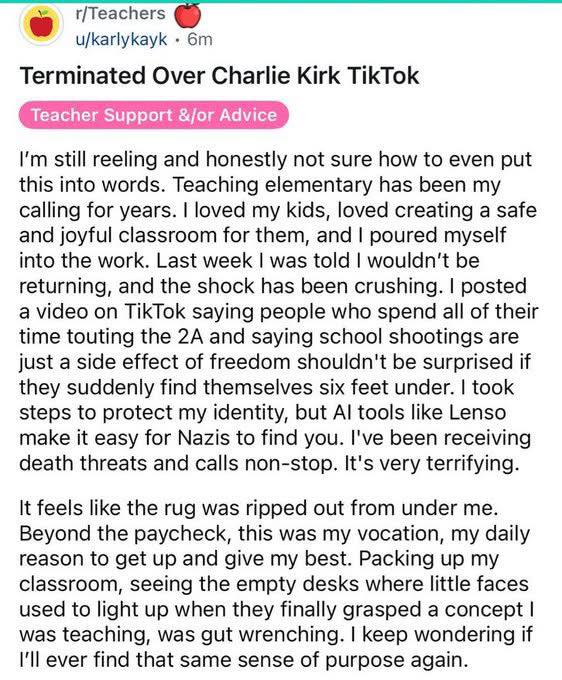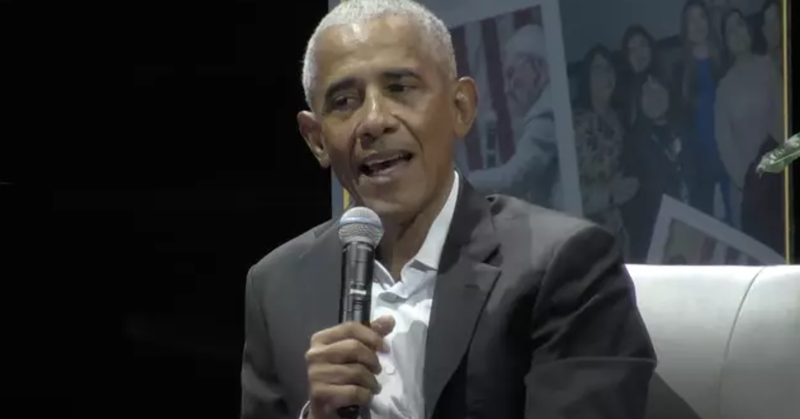The Fallout: A Teacher’s Controversial Dismissal and Unwavering Rhetoric
The recent dismissal of a teacher for offensive remarks targeting Charlie Kirk has ignited a firestorm of debate. Beyond the immediate loss of employment, the situation reveals a deeper conflict between freedom of expression and professional responsibility, further complicated by the teacher’s continued use of inflammatory language. This post explores the multifaceted fallout of this contentious situation.
The Initial Incident: Offensive Comments and Subsequent Dismissal
The catalyst for this controversy was a series of comments made by the teacher, deemed by their employer to be “disgusting” and directed towards conservative commentator Charlie Kirk. The exact nature of these remarks remains publicly unclear, though their severity was apparently sufficient to warrant immediate termination. The school district cited a breach of professional conduct as the reason for dismissal, emphasizing the importance of maintaining a respectful and inclusive environment for all students. This decision, however, has been met with significant pushback from various quarters.
The Teacher’s Perspective: A Battle of Principles?
The teacher, facing unemployment and a damaged reputation, maintains their stance. While acknowledging the consequences of their actions, they refuse to retract their core beliefs, continuing to label individuals they disagree with as “Nazis.” This unwavering commitment to their perspective, regardless of the professional ramifications, highlights a deeply held conviction – one that appears to prioritize ideological expression over career stability. Is this a principled stand, a stubborn refusal to compromise, or something else entirely? The question remains open to interpretation.
The Broader Implications: Free Speech vs. Professional Conduct
This incident raises critical questions about the boundaries of free speech, particularly within the context of a professional role. While teachers undoubtedly possess the right to express their opinions outside of the classroom, their actions within the professional sphere are subject to stricter scrutiny. The school district’s decision to dismiss the teacher underscores the potential clash between personal beliefs and the responsibility to uphold a professional standard of conduct. This delicate balance requires careful consideration and a nuanced approach to address competing interests.
Navigating the Grey Area: Defining Acceptable Discourse
Where exactly is the line drawn between expressing a controversial opinion and behaving unprofessionally? This incident demonstrates the difficulty in defining acceptable discourse, particularly in an increasingly polarized climate. The school district’s decision, while arguably justified given the severity of the comments, also raises questions about potential biases and the potential for inconsistent application of disciplinary measures. This lack of clear guidelines could lead to future controversies and further complicates the already sensitive issue of free speech in educational settings.
Looking Ahead: Lessons Learned and Future Considerations
The situation involving the dismissed teacher serves as a stark reminder of the complex issues surrounding free speech and professional responsibility. It forces a reevaluation of existing policies and highlights the need for clearer guidelines to navigate such delicate situations. Furthermore, the incident underscores the ongoing debate around tolerance and civility in public discourse. Perhaps the most crucial takeaway is the imperative for open dialogue and constructive engagement – a challenge that extends far beyond the confines of this single case.




